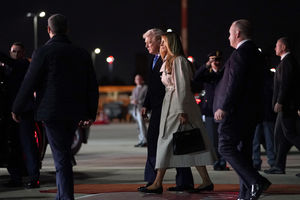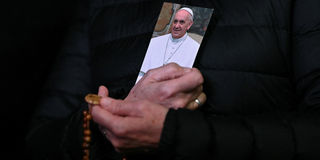
A person holds a picture of Pope Francis and a rosary during a prayer service at St. Peter's Square, as Pope Francis continues his hospitalization, at the Vatican, February 25, 2025.
Every generation or two, humanity is blessed by the presence of a transformational figure whose commitment to lift the oppressed and the marginalised resonates across the globe’s national, political, and ideological landscapes.
Pope Francis was that kind of transcendental figure. From my perspective, other leaders of similar life-affirming convictions who achieved universal renown in the last 100 years were Mahatma Gandhi, Martin Luther King and Nelson Mandela. Others no doubt will have their own lists.
The Pope we lost this week was one of history’s most compassionate leaders. His commitment to peace, justice, inclusion, and ecumenism was uncompromising, and he spoke fiercely in defence of the poor, the marginalised and those suffering oppression. But his voice was utterly anomalous, being aired within a global system whose “values” were at the opposite end of his and were paid little heed by powerful political leaders and the titans of finance and industry.
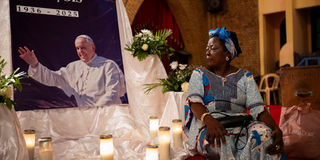
A Christian Catholic woman poses in front of the poster of late Pope Francis after she attended a Mass in his honor at Notre Dame Parish, in Kinshasa, Democratic Republic of Congo April 25, 2025.
Similarly, from the very first days of his papacy in 2013, the plight of millions of migrants fleeing poverty, oppression or war was heartbreaking for Francis.
Despite some important exceptions, migrants were being denied humanitarian entry into a wealthy Fortress Europe for leaders’ domestic political gains at a time when living standards were rapidly declining for most people (apart from the super-rich) because of neo-liberal policies - and hemorrhaging leaders’ political support.
Pope Francis also dramatically shifted the focus of the Catholic Church, and the College of Cardinals appointments, towards the global South. Cardinal Timothy Dolan of New York recalled Tuesday that virtually every time he heard of a new appointment by Pope Francis, he had to scurry to his world atlas to know where the newcomer’s country was located.
On ecumenism, Francis pursued détente with Muslims worldwide. One particular event won over Muslims big time. When a journalist asked why he did not mention the religion of Muslim terrorists, NPR reported that the Pope rejected the notion that Islam was violent, adding that "If I speak of Islamic violence, I should speak of Catholic violence too."
He added, in one of his boldest assertions, that despair and violence result from the idolatry of wealth, and grow when “there are no other options, and when the center of the global economy is the god of money and not the person."
In this context, two major groundbreaking articles this month on the radical growth in US inequality are worth reading. The New York Times (Talmon Smith) and the Wall Street Journal (Juliet Chung) spelled out the dramatic, trillion-dollar gains that the richest of the rich have accrued in the US, while the entire bottom half has gained a dismal one tenth of one percent per year over the last 35 years. We are headed for disaster unless this is rapidly reversed.
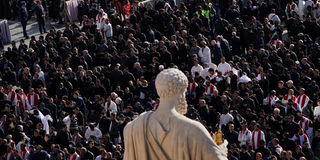
Faithful gather, ahead of the funeral Mass of Pope Francis in St. Peter's Square at the Vatican, April 26, 2025.
In another dramatic decision, Pope Francis suspended the sainthood process for Pope Pius XII, not for the controversy surrounding his awareness of the Holocaust, but until a miracle is attributed to him, which is an essential step for sainthood.
Despite the clarity of Francis’s critical views on global leaders’ policies and actions, his passing saw many of the world’s most powerful leaders gushing praise over his virtues and accomplishments – as expected of course! But it is a sign of our diminished world that such pretenses are published robotically in the media without a hint of irony, leave alone alerting their audiences about the double speak.
Indeed, within a day of his death, media reports began emerging that many groups felt that Francis had gone too far in his embrace of compassion and inclusion and they hoped the cardinals would elect a more traditional religious figure. And while the traditional versus the modern divide is real in the Church, we know that powerful secular forces are pushing for a change from the causes Francis so strongly espoused.
On a personal note, I want to record my appreciation that Francis died during Easter, which meant the world to him. Despite being gravely ill, on Holy Thursday he paid a visit to a Rome prison for an audience with 70 inmates. Even on Sunday, looking extremely frail, he made a last heroic effort and participated in Easter Sunday mass. He was gone Easter Monday.
I think most older readers will have seen situations where a critically ill elderly relative or friend is somehow able to hang on till someone very close arrives. I cannot think of a more beautiful way for Francis to have said goodbye.
Despite his passionate and globally resonant advocacy of the most downtrodden, the world Francis leaves behind is in utterly worse shape than when became Pope in 2013. It is much more chaotic, growing radically more unequal and more readily committing to war, which is forbidden by the United Nations Charter unless authorized by its Security Council.
But as serious western strategists like Henry Kissinger, Anatol Lieven and Prof Jeffrey Sachs urged before the Russian invasion, Europe needs to engage with Russia about its genuine security concerns that the US had pledged to address when Gorbachev dismantled the Soviet Union. Europe has already seen the war impose severe economic setbacks for its citizens, leading to virtually all major European governments falling or being severely weakened, including in Germany, UK, and France.
But instead of trying to negotiate out of the impasse with Russia, Europe has committed to an enormous re-armament campaign which will take an even heavier toll in social welfare of its citizens – but will provide a bonanza for its arms manufacturers. It is not often I am genuinely mystified by political end games. As I am about the seemingly self-defeating tariff gambits.
But this chaos is not in any way a failure for Francis. What visionary and inspirational leaders like him, Gandhi, Martin Luther King Jr and Mandela achieve through their rich lives and devotion to humanity is the keeping alive of universally accepted values that provide hope for a better world. These four, and other morally driven leaders like them, have no political power.
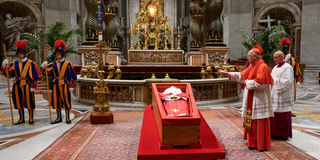
The body of Pope Francis lies in a casket before it's sealed, at St. Peter's Basilica, ahead of his funeral at the Vatican, April 25, 2025.
Doctrinal matters apart, Pope Francis was human, and his life’s story can also be seen as contradiction, growth, and redemption. Jorge Bergoglio’s deep faith led him into the Church in Argentina where he rose to be auxiliary Bishop of Buenos Aires. This was at a time where a vicious military junta’s “dirty war” tortured and killed thousands who opposed their rule. He faced accusations, that he strongly denied, of not protecting two priests with anti-government views.
In 1992 he was unexpectedly appointed Archbishop of Buenos Aires. That is when he began actively seeking out the poor and gained a strong following. In 2001 he was named Cardinal by John Paul II.
In the Conclave that elected of Pope Benedict XVI in 2005, Francis received the second highest number of votes in all rounds. He was clearly already well liked by his peers, for his engagement with the poor, executive and organizational skills and his intelligence and modesty.
The Conclave in 2013 elected Francis as Pope because the cardinals, after what many saw as a desultory and sometimes divisive and even damaging Benedict papacy, wanted radical change to bring the Church closer to the people. Francis as we have seen more than lived up to expectations and became the most transformational global figure of the 21st century.
Salim Lone was Spokesman for Mr Raila Odinga, one-time Prime Minister of Kenya and opposition leader (2005-2013), and Director of Communications and Spokesman at the United Nations (1997-2003).


